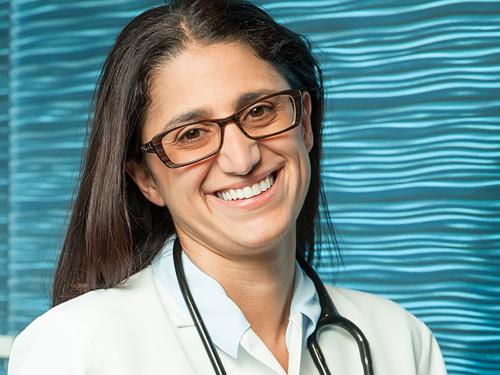The crusading pediatrician who four years ago helped bring the fight for clean-water justice in Flint to the national spotlight will speak at SUNY Oswego this fall about the newly announced Oswego Reading Initiative book for this summer, her award-winning "What the Eyes Don't See."

Dr. Mona Hanna-Attisha
Mona Hanna-Attisha -- an immigrant, physician, scientist and now an activist -- will appear on campus Sept. 25 to talk about her research and advocacy in the water crisis, an environmental disaster that has moved a nation.
SUNY Oswego chose Hanna-Attisha's book -- whose full title is "What the Eyes Don't See: A Story of Crisis, Resistance and Hope in American City" -- over at least two dozen other candidates for the annual freshman summer read. The college is in the midst of a two-year cross-campus project titled "Grand Challenge: Fresh Water for All."
"We believe this book's topic and the discussions that we hope will flow from it will enhance our community's understanding of the significance of this (grand) challenge," said Rameen Mohammadi, chair of the Oswego Reading Initiative (ORI) Committee and associate provost for undergraduate and special programs. "The book will also add to our campus-wide discussions on diversity, equity and inclusion."
"What the Eyes Don’t See" is Hanna-Attisha's account of research that showed her young patients had suffered from higher levels of lead in their blood in the year since the city of Flint, Michigan, changed its water source in 2014. Water now was flowing into Flint homes from the Flint River -- without adequate treatment -- where once it had been drawn from the Great Lakes.
Ingestion of lead, leached from lead pipes through which the water flowed, can lead to long-term cognitive and behavioral problems in children (a finding that, at even low levels of lead in the blood, received considerable research support during the longitudinal Oswego Children's Study at SUNY Oswego). Hannah-Attisha went public with her research and faced a brutal backlash from state agencies trying to discredit her. National media reports told of her persistence and single-minded sense of mission -- the environmental injustice faced by the city's poorest residents.
'Moral outrage'
In "What the Eyes Don't See," Hannah-Attisha chronicles the disaster in Flint -- the story of a city on the ropes that came together to fight for justice, self-determination and the right to build a better world for their children. She was called to testify twice before Congress, awarded the Freedom of Expression Courage Award by PEN America and the Great Lakes Great Read Non-Fiction Award, and was named one of Time magazine’s 100 Most Influential People in the World for her role in uncovering the Flint water crisis and leading recovery efforts.
"Her book has power precisely because she takes the events she recounts so personally…A great virtue of her book is the moral outrage present on every page,” wrote The New York Times Book Review.
author is founder and director of the Michigan State University and Hurley Children’s Hospital Pediatric Public Health Initiative, an innovative and model public health program in Flint. She has appeared on CNN, MSNBC, BBC and countless other media outlets championing the cause of children in Flint and beyond. She is founding donor of the Flint Child Health and Development Fund (flintkids.org).
As it has for nearly 20 years, the ORI Committee continues the annual quest to find and choose among books that highlight, through activities early in the academic year, what SUNY Oswego values as an academic community, including critical thinking, engagement with ideas and interaction with faculty and staff.
For more information and to see a list of past selections, visit the ORI website.


